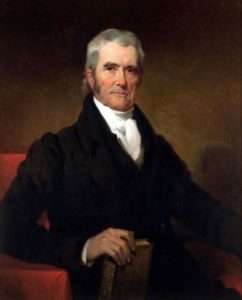The Volokh Conspiracy
Mostly law professors | Sometimes contrarian | Often libertarian | Always independent
Today in Supreme Court History: September 24, 1755
Editor's Note: We invite comments and request that they be civil and on-topic. We do not moderate or assume any responsibility for comments, which are owned by the readers who post them. Comments do not represent the views of Reason.com or Reason Foundation. We reserve the right to delete any comment for any reason at any time. Comments may only be edited within 5 minutes of posting. Report abuses.
Please to post comments



"Because I say we're the deciders"
1. This passage in Marbury v. Madison was dicta and Marshall later regretted it. 2. Marshall should have recused himself from that case because he was directly involved in the dispute. 3. Judicial review was actually an accepted principle before Marbury. Marshall’s predecessor, John Jay, and George Washington knew as much when Washington sent Jay a formal request on whether Jay could be consulted on the Constitutionality of various measures considered by the Executive Branch. (Jay replied that under the Constitution his Court could only rule on “cases and controversies” and not render advisory opinions, but the principle of judicial review was implicit in the exchange.)
I think saying Marshall was "directly involved in the dispute" is a stretch. He was not involved at all in the decision to withhold the commission to Marbury, which was the decision that was at issue. His only involvement was in accidentally failing to deliver the commission prior to that.
The public would assume he would be upset at Madison. One of the “midnight judges” his boss (Adams) intended was not appointed. Which gave him a chance to show his independence by ruling against Marbury. This is why, no matter what their ruling would be, judges recuse themselves.
Twentieth Century Airlines v. Ryan, 74 S.Ct. 8 (decided September 24, 1953): Reed refuses to stay administrative proceedings against “irregular” air carriers who had been ordered to stop mergers and refinancings because they were done without Civil Aeronautics Board approval; no irreparable injury shown and administrative proceedings afforded them adequate due process
Philip Morris USA, Inc. v. Scott, 561 U.S. 1301 (decided September 24, 2010): Scalia stays enforcement of class action judgment against tobacco companies for giving false information about addictive properties of nicotine (judgment also required companies to fund smoking cessation programs); defendants have possible due process defense in that Louisiana court held that each plaintiff did not have to prove individualized fraud for damages (as opposed to access to antismoking programs); cert was ultimately denied, 564 U.S. 1037 (2011)